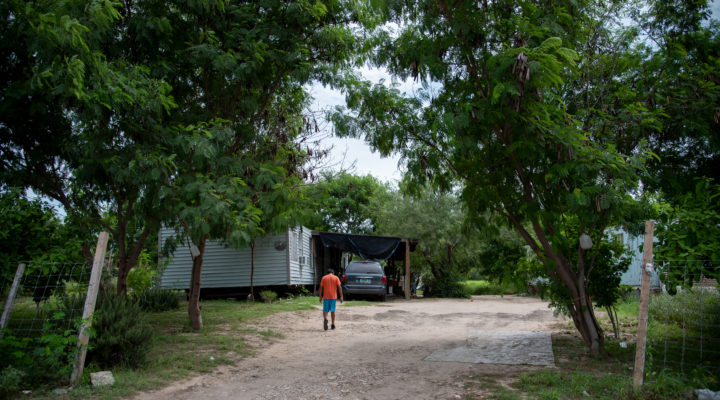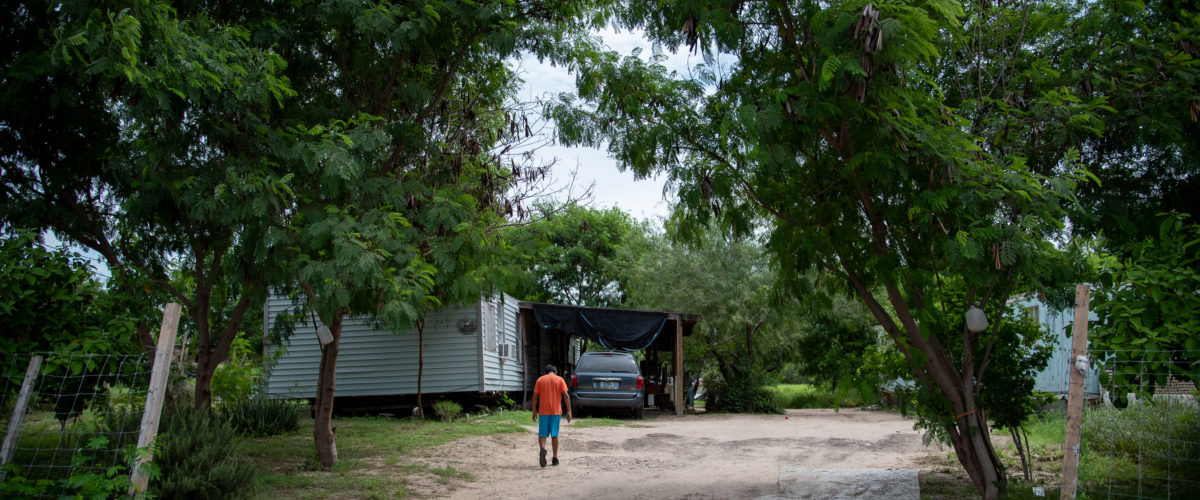Like most of the Hispanic residents of Hidalgo County, Texas, I’ve met, Pastor Eloy Mendiola of Iglesia Bautista Calvario de Weslaco is slightly puzzled by the word “poverty.” Perhaps it doesn’t translate well to Spanish. Or maybe the rift runs deeper.
“Poverty, but according to whom?” he asks, albeit in Spanish, his first language. He refuses to speak English unless he’s getting paid to, he remarks with a smirk. “That’s what the world doesn’t understand. Poverty doesn’t come from your environment; poverty comes from what’s inside of you.”
Indeed, Mendiola hails from a poor, rural community in Mexico, where generations of his family worked for mere pennies in the fruit and produce fields. But he wields himself like the CEO of Goldmann Sachs — imposing, razor-sharp, with effortless poise. He towers well over six feet with a two-inch boost from his dusty cowboy boots. Decades of wisdom cascade down his chest in a half-foot gray beard, reaching away from a charcoal mustache, tightly waxed and extended toward his ears. The camera is ready, so he polls my opinion on wearing his sombrero. “Absolutely,” I say, as he tips a sandy-white, ten-gallon hat over his head and settles in the fluorescent glow of the sanctuary, now empty as Friday afternoon draws to a close.
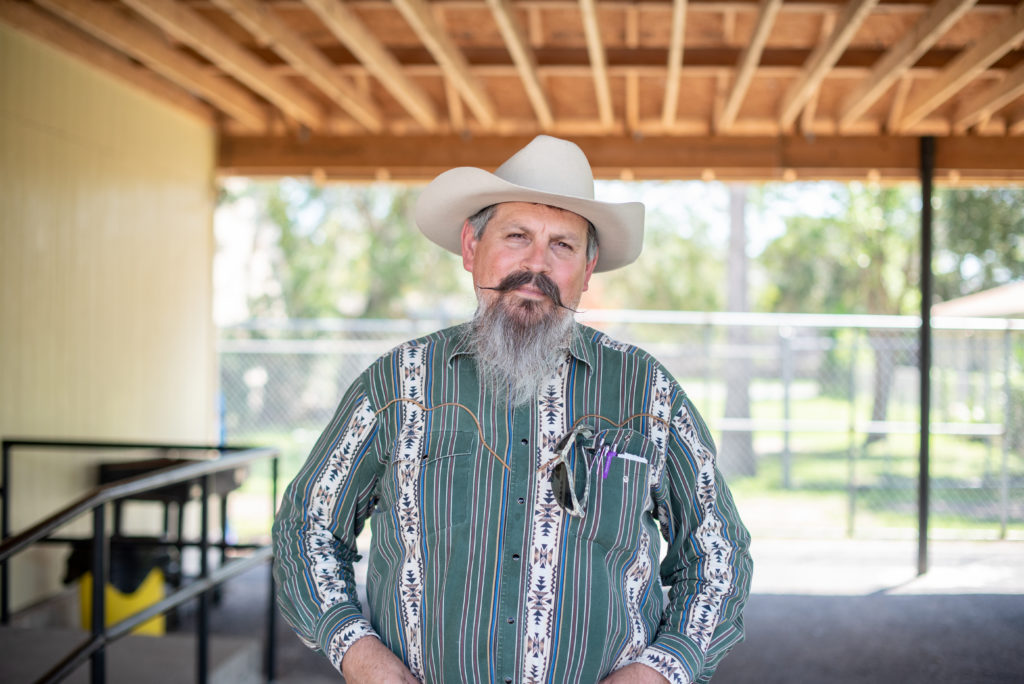
“I believe that the first thing humans must address, and was true in my case, is the inner life,” Pastor Mendiola says. “The root of the problem of humanity is the heart. Poverty is fixed from the inside.”
Mendiola always possessed the scrappy, hardworking spirit of his family, he says. But he also understood that true liberation from poverty would come through education — one that integrates intellect with God-given purpose. Education isn’t just a feeding of your mind, he explains, but the awakening of an inner voice, an inner power from God that neither poverty nor riches can command. Though his grandmother imparted to him a dynamic faith, Mendiola’s family simply didn’t model the power of education but instead sold their labor for cheap in the fields. As a young man, Mendiola briefly joined them, but his own soul was beginning to wake up, and it was restless for more.
“I realized the fields weren’t going to take me very far, because my family never went very far on their abilities, going to work and selling their labor, using their hands,” he says.
Education isn’t just a feeding of your mind, but the awakening of an inner voice, an inner power from God that neither poverty nor riches can command.
“Working in the fields is a really difficult life, and even more so in Mexico. A lot of people come to the United States and continue doing the same thing. They think that, here, they will progress simply because they get paid better. But it’s the same. I became convinced that people must educate themselves and do so from the inside. I decided I wanted to make a difference, because of Jesus Christ. That’s the waking up that comes from the inside.”
Mendiola’s growing sense of vocation led him out of the fields and back into school, despite that his peers were beginning to earn a little money and disregard their studies. Eventually, he earned an advanced degree and began teaching math at the university, which propelled him to the United States to pursue a career in politics.
God, however, had a different idea, he says. Deep down, Mendiola knew that his call to spiritual awakening could not end with him; his journey would expand, as he helped his own people — Mexicans and immigrants living in Texas — wake up to education and to the spiritual power within. Instead of politics, he enrolled in seminary, where he studied theology and trained to become a pastor.
After more than a decade at Iglesia Bautista Calvario, Mendiola has helped his congregation mount a clear assault on systemic poverty in the Rio Grande Valley, offering ESL, GED, and citizenship classes as well as a food pantry and free clothing boutique. Yet, just outside of McAllen, where opportunity for education and employment abounds, the fight against poverty remains spiritual, rooted in the heart, Mendiola explains. Socio-economic forces are indeed formidable, but every human being retains the power to choose more in life, to cultivate true riches.
“People want to separate the spiritual from the secular, but that’s not possible. If a person has not experienced this awakening, he or she can have a lot on the outside, but, in reality, continue with the same inner poverty. We have many cases of people — artists, millionaires — who achieve the highest level of outer riches and power, but soon realize that there’s nothing else there, only money, power, and influence. So, I believe that the first thing humans must address, and was true in my case, is the inner life. The root of the problem of humanity is the heart. Poverty is fixed from the inside.”
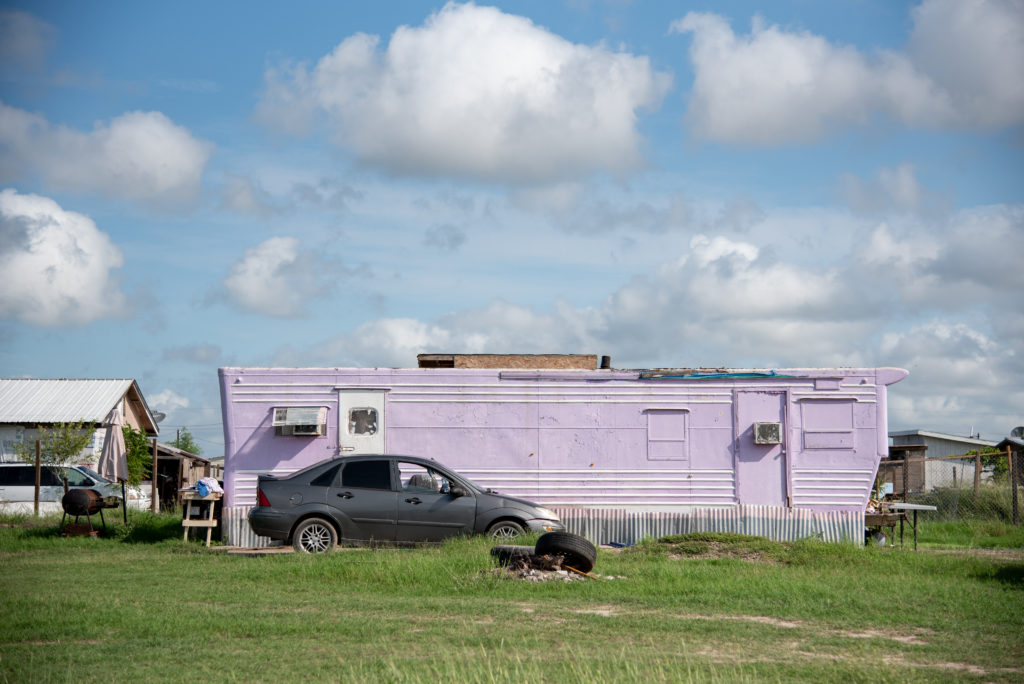
Hispanics and Latinos comprise more than 92% of Hidalgo County’s population, and immigration has touched nearly every individual in some way.
Hidalgo County and the surrounding counties of the Rio Grande Valley continue to host some of the highest poverty rates in the United States. With nearly 34 percent of families and individuals living below their federal poverty threshold, Hidalgo County consistently boasts the highest poverty rate in Texas. Unlike other pockets of rural poverty across the country, however, the greater McAllen area includes more than 800,000 residents and remains the fifth largest metro area in the state. Widespread deficiencies in health care, employment, and education, therefore, are not rooted in isolation or disinvestment, but in the most prevailing reality of life: immigration.
“There are several pockets of extreme poverty along the U.S. southern border because it is full of those who have immigrated from Mexico,” says Diann Berry, Cooperative Baptist Fellowship field personnel and ally with Iglesia Bautista Calvario.
“They’re leaving for a reason, and usually it’s not a good reason. When they come in, they have nothing and have to start completely from scratch, building a home, saving money, working and things like that. And typically, when they immigrate in, a border town is as far as they get, so they stop and live there.”
The root of the problem of humanity is the heart. Poverty is fixed from the inside.
While the other 3,000 counties in the United States struggle to cope with the notion of immigration, Hidalgo County has immigration written into its very DNA, Berry says. In fact, McAllen, Texas, is home to the single largest immigration processing center in the country. Unsurprisingly, Hispanics and Latinos comprise more than 92 percent of the population, making a shared border, economy, and identity with Mexico simply commonplace, especially with the inception of the North American Free Trade Agreement in 1994, which transformed the greater McAllen area into a bustling international trade hub. Among most families living in poverty, immigration tells a familiar narrative: a family arrives from Mexico with few resources, speaks little or no English, acquires low-wage jobs working in fruit and produce fields and seeks to build life anew from a low-income housing area or “Colonia.”
Because immigration places such acute force on first-generation migrants, adult education and development is paramount in addressing systemic poverty, Berry explains. According to the Migration Policy Institute, second and subsequent-generation immigrants from Mexico display higher education levels as well as higher household incomes than their parents, commensurate with spending more childhood years in the U.S. to naturally develop English proficiency, attend public school and build their imagination for the future. Those who immigrate as adults, on the other hand, have vastly fewer opportunities to receive public education, learn English and conceive of a well-paying career, leading much straight back into the backbreaking, manual-labor jobs they left in Mexico.
“Many migrant workers who work in the fields grew up in migrant families,” Berry says. “Their grandparents worked the fields, their parents worked the fields, and that’s all they knew, so they work the fields. But at some point, many of them realize, ‘If I don’t do something about my situation, I’m going to be working in the fields my whole life.’ They want to step up out of the hole they’re in and try to become employable. So, the first thing they need to do is learn English, because so many of the jobs, even here in the Rio Grande Valley, require somebody who is bilingual.”
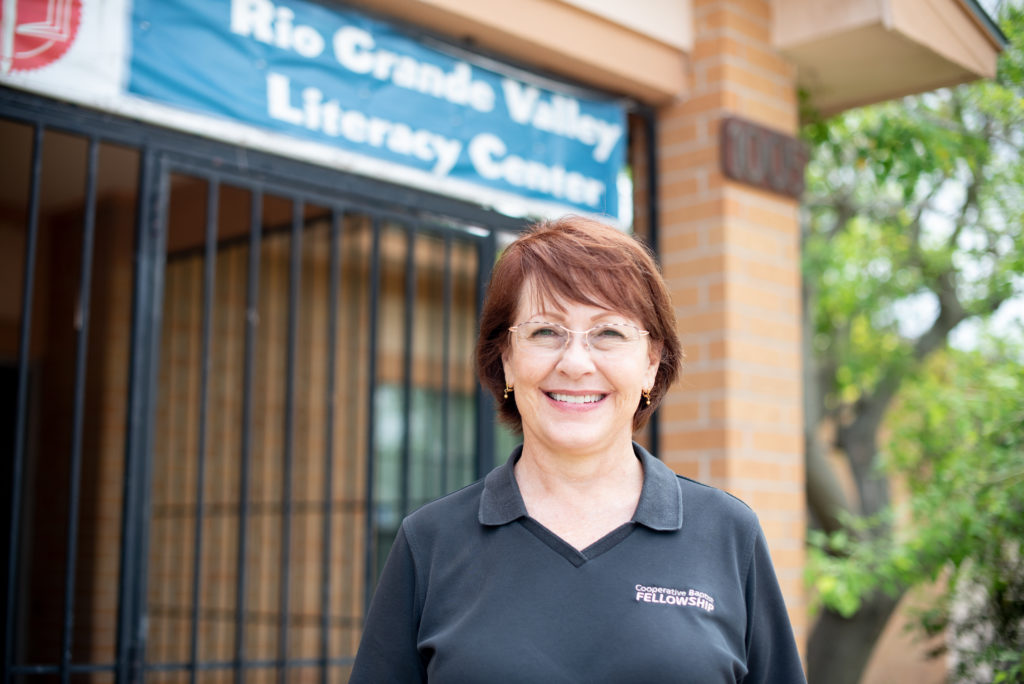
Diann Berry arrived in Hidalgo County in 2011 as Cooperative Baptist Fellowship field personnel addressing systemic poverty and founded the Rio Grande Valley Literacy Center.
The fight against systemic poverty in Rio Grande Valley is an inner work, Berry explains, not only because U.S. employers largely require a high school or college degree, but because education is typically the only missing piece of the puzzle for Mexican immigrants, who, as a whole, possess a certain grit and a vastly stronger work ethic than most Americans. Effectively, if Hispanic immigrants can add English proficiency and a general equivalency diploma to their desire to work hard, she says, opportunities to emerge from poverty multiply exponentially. That’s why Berry founded the Rio Grande Valley Literacy Center when she arrived in Hidalgo County eight years ago with a mission to alleviate poverty.
If Hispanic immigrants can add English proficiency and a general equivalency diploma to their desire to work hard, opportunities to emerge from poverty multiply exponentially.
Located in Pharr, Texas, the RGV Literacy Center provides ESL training, GED courses and citizenship classes to adults seeking the economic boost that education brings, no matter their age. In fact, RGVLC students now range from age 18 to 72 years old. For many Hispanic immigrants, Berry explains, it’s never too late to take responsibility for one’s education and invest in the next step. Many older women, for instance, apply for ESL classes at the literacy center only after their husband — who withheld them from learning English — has passed away. Other students struggle to negotiate multiple jobs and still attend classes, she says, but in the end, students will negotiate nearly any obstacle to persist in their decision.
For Aracely Salazar, ministry assistant with Iglesia Bautista Calvario, repeated decisions to push through barriers and invest in her education made all the difference in her journey through poverty. When she immigrated to Texas with her family in 1981, she spoke no English and began working 18-hour days in the fields picking fruit, all the while trying to cram two semesters of school into four or five months. Eventually, she couldn’t sustain both and dropped out of school halfway through ninth grade. Ironically, her journey toward education had only begun.
“During those times I put myself to learning English and taking care of my family,” she explains. After teaching herself English, Salazar continued to vocational school, where she earned a professional secretary degree. Through two decades, three kids, a divorce and an abusive husband, Salazar rose from one job to the next, eventually becoming an administrative assistant with the Donna Independent School District just east of McAllen. A second divorce, however, forced Salazar to discontinue her career as a secretary and start anew, so she began searching beyond mere education, she says, toward her passion, toward the voice of vocation. That voice, she explains, was calling her to share her lifelong journey of faith with others and become a local missionary.
Ultimately, discovering a deeper vocation was the true key to finding peace on the other side of poverty.
She picked up the phone and contacted Rio Grande Bible Institute, which accepted her application and paired her with a local congregation, Iglesia Bautista Calvario, where she has now served for five years as a part-time minister while earning her degree in theology. Learning English and acquiring a degree was crucial to supporting her three sons as a single mother, she explains, but ultimately, discovering a deeper vocation was the true key to finding peace on the other side of poverty.
“God showed me that I needed to go there to find him, and since then, everything changed,” Salazar says. “God has given me a lot of good things, although we come from a family that is very poor, with a lot of difficulties. It was a hard ride. What we have now is not so much about the jobs, but the peace. God is so great, and he’s given us so much, and I see it in my family. Before, we would go to work and do whatever, but now we can do anything with God.”
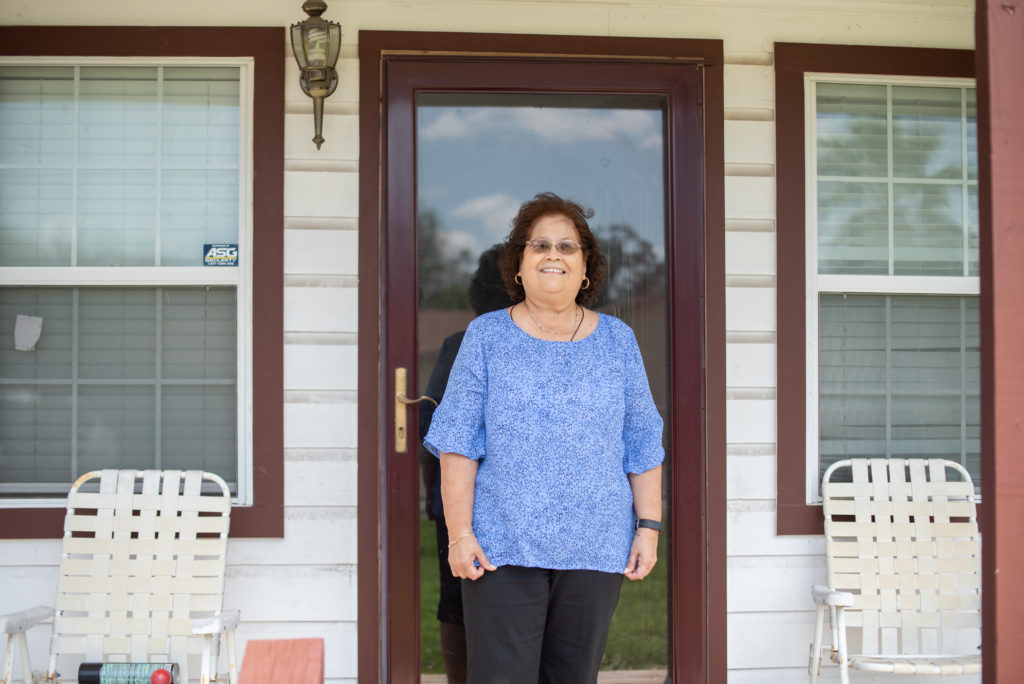
Lupita Marquez grew up living in poverty in Mercedes, Texas, and now serves with Iglesia Bautista Calvario de Weslaco and their food pantry, which supports more than 130 families each month.
Today, Salazar and Eloy Mendiola serve side-by-side as Iglesia Bautista Calvario seeks to inspire its community toward literacy and education, offering professionally-taught GED, ESL and citizenship courses from the church building just of the 83 expressway. IBC is even advocating at the Mexican consulate to develop a Spanish education system, Mendiola adds. Along the way, the church supports more than 130 families each month with a food coop and clothing boutique, creating a deeper relationship with local families. Sooner or later, he explains, those stuck in cycles of poverty must begin the search, not only to feed their minds but to discover a passion and purpose behind their life that only comes from God. Nobody is exempt from listening for the inner voice of vocation, he explains, even and especially those seeking a pathway out of poverty.
For those of us on the other end of the productive chain, the only thing that can lift us up is education. But my concern is that sometimes we see education as a commodity.
“We have to educate ourselves,” he says. “For those of us on the other end of the productive chain, the only thing that can lift us up is education. But my concern is that sometimes we see education as a commodity. I am a teacher of vocation. We are different from the merchants of education.”
“I’m talking about a spiritual awakening. People need to search for God because, truthfully, without God, it’s all building for nothing. We are not made for that. People grow when they develop a deeper knowledge of God. And you can go anywhere, to the depths of the jungle, wherever you want, and you’re going to find that people adore something because that searching is already inside of us. Even if people don’t believe in God, they have to begin to believe in something because you can’t wake up to something that you are not searching for.”
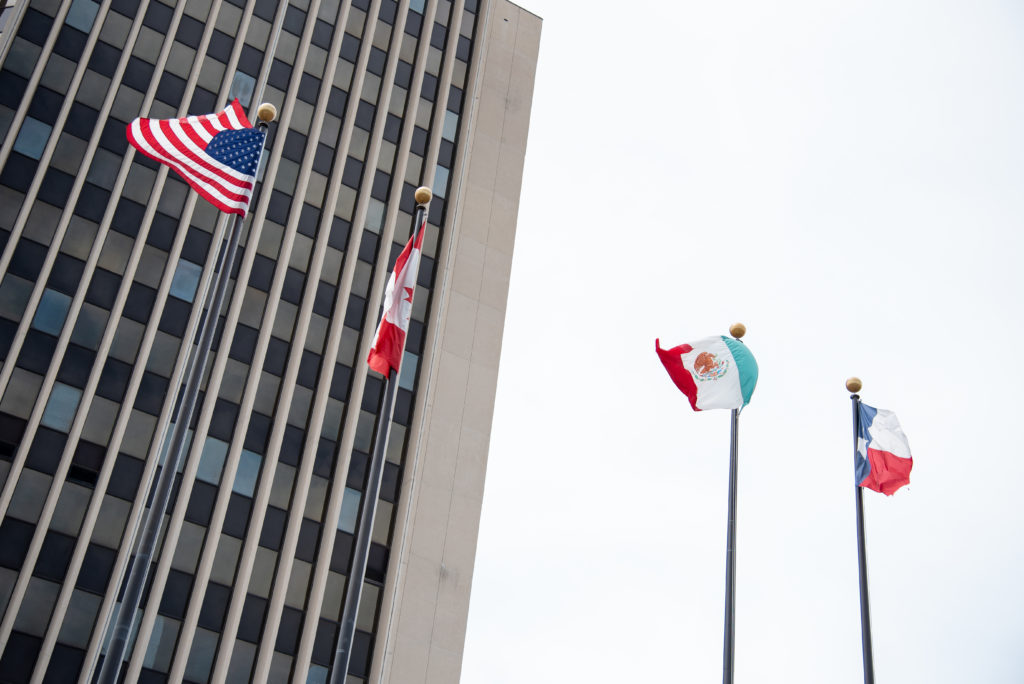
With the inception of the North American Free Trade Agreement in 1994, McAllen exploded as an international trade hub and currently remains the fifth-largest metro area in the state of Texas.
Read more in the Hidalgo County, TX series:
Along the Texas-Mexico border, overcoming poverty requires spiritual liberation
A Mexican immigrant’s harrowing rise from poverty in Hidalgo County, Texas
Hidalgo County, Texas: A Mighty Current
Photo Gallery: Hidalgo County Texas
Video: Diann Berry on Education
Video: Diann on Literacy Center Success Story
Audio: Eloy Mendiola (coming soon)
Related commentary at baptistnews.com:
On immigration, Franklin Graham is dead wrong | Mark Wingfield
The day life changed for a legal immigrant — and his church | Lauren Efird
Related news at baptistnews.com:
Engaging the immigration debate: Ethicist, pastor differ on New Sanctuary Movement
Border wall, immigration among top concerns for Hispanic Baptists, leader says
Despite the Rio Grande’s unmistakable capacity to both give and strip away life, there is yet a more formidable power in Hidalgo County, Texas, and it flows from within. It is a mighty current of resilience, propelling you toward more than fields and dollars, toward another semester of English classes, toward finally earning your GED, toward the purpose and passion that God has placed inside of you, toward a new opportunity to grow, to thrive and to find home once again.
This series in the “Resilient Rural America” project is part of the BNG Storytelling Projects Initiative. Has the United States forgotten its countryside? What strength and resilience may yet be stirring outside our city limits? In “Resilient Rural America,” we attempt to answer these questions when we visit these unique communities to examine the singular nature of poverty in rural America and tell the stories of development among its courageous and resilient people.
_____________
Seed money to launch our Storytelling Projects initiative and our initial series of projects has been provided through generous grants from the Christ Is Our Salvation Foundation and the Eula Mae and John Baugh Foundation. For information about underwriting opportunities for Storytelling Projects, contact David Wilkinson, BNG’s executive director and publisher, at [email protected] or 336.865.2688.

